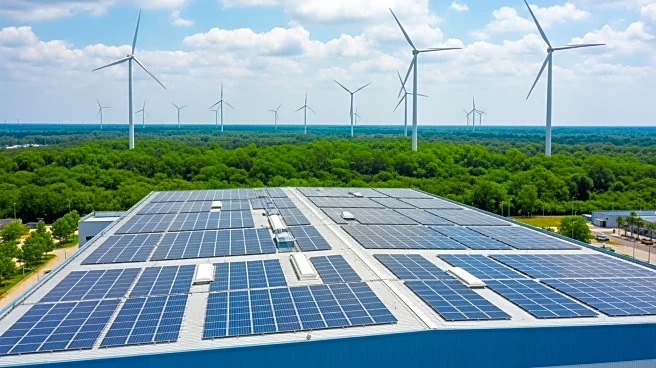What's Happening?
India's manufacturing sector is undergoing a significant transformation as the country aims to meet its ambitious climate targets, including net-zero emissions by 2070 and a 50% share of renewables in the energy mix by 2030. Manufacturers are aligning
their growth strategies with environmental stewardship, driven by global climate commitments and domestic policy incentives. This includes adopting cleaner technologies, optimizing supply chains, and investing in green infrastructure. The government is promoting a circular economy and initiatives like the National Green Hydrogen Mission to encourage sustainable practices. Rooftop solar installations are becoming common, reducing dependence on fossil fuels and lowering operational costs. Energy efficiency is also a focus, with technologies like Brushless Direct Current (BLDC) fans reducing power consumption significantly.
Why It's Important?
The shift towards sustainable practices in India's manufacturing sector is crucial for achieving national climate goals and enhancing global competitiveness. By adopting clean energy solutions and improving operational efficiency, manufacturers can reduce costs and mitigate environmental impact. This transformation not only complies with regulatory requirements but also resonates with environmentally conscious consumers and investors. As India aims to become a developed nation by 2047, integrating environmental considerations into business strategies is essential for long-term success. The transition towards carbon neutrality by 2030 presents opportunities for manufacturers to tap into new markets and attract investment, contributing significantly to national and global climate goals.
What's Next?
Manufacturers in India are expected to continue investing in renewable energy solutions and sustainable technologies to meet climate targets. The government's commitment to achieving 500 GW of non-fossil fuel capacity by 2030 will further incentivize these efforts. As the sector progresses towards sustainability, companies will likely focus on enhancing operational efficiency and integrating sustainability into core business strategies. This balance between growth and responsibility is crucial for long-term success, positioning manufacturers as leaders in sustainable industrial practices.
Beyond the Headlines
The broader impact of India's transition towards carbon neutrality by 2030 includes opportunities in renewable energy offsets, green technology adoption, and sustainable product development. Advanced technologies like green hydrogen production and energy storage solutions are paving the way for a sustainable industrial future. By investing in these technologies, manufacturers can enhance resilience, reduce operational risks, and play a pivotal role in India's green transformation.
















